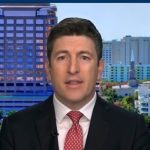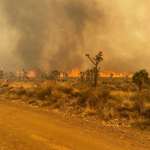CHICAGO — The last time Netroots Nation held its convention here, seven of eight Democratic candidates for president spoke. That year included blockbuster draws like Barack Obama and Hillary Clinton.
It was a who’s-who, head-turning affair that helped put the annual conference of progressive activists on the map. Lefty darlings Bernie Sanders, Elizabeth Warren and Alexandria Ocasio-Cortez energized the Netroots groupies at subsequent confabs.
But times have changed. President Joe Biden isn’t attending this year, nor are any of the congressional superstars who graced the stage in the past. The opening day headliner was Chicago Mayor Brandon Johnson, a former school teacher and union organizer. He’s a rising progressive star — but most attendees had never even heard of him before he won a contentious mayoral election in April.
The 30 Netroots Nation attendees POLITICO talked to say they aren’t motivated to see namey names on stage — though a few, admittedly, are self-described “fangirls” of AOC.
“Everyone is pivoting to more local because that’s how you make the biggest impact,” said Jess Moore Matthews of Backbone Digital Leaders. “I think it’s a move away from the influencer politician.”
It’s not like there are nobodies on stage: Reps. Greg Casar of Texas, Maxwell Alejandro of Florida, Summer Lee of Pennsylvania and Pramila Jayapal of Washington are all big names from the left.
Attendees said their focus is on broader issues related to organizing voters. The convention, which has drawn more than 2,900 attendees — its second highest attendance ever — runs through Saturday.
Ruby Powell-Dennis of Tennessee was even more blunt. “Look, Black women are not looking to Bernie Sanders from Vermont or AOC from New York. This is a movement, and movements don’t need saviors,” she said after hearing Johnson speak on Thursday.
When Netroots started almost two decades ago, it was trying to build credibility, so names mattered, said Markos Moulitsas, who started the progressive Daily Kos blog and helped with spin off the Netroots Nation conference. Now, the group is less focused on blogging and more on organizing.
Initially, “there was a lot of fear and distrust about our efforts,” Moulitsas said Friday in between radio interviews from the conference. “Some thought that we’d somehow push the party too far to the left. So getting people like [former Senate Majority Leader] Harry Reid to show up was validating to the movement and a signal to the broader party establishment that we weren’t dangerous.”
The conference had a tendency to create news. Warren, who last took the stage in 2019, wowed attendees and gave early liftoff to her presidential bid. And who can forget the controversy created in 2015 when Sanders was shuffled off the stage for his Black Lives Matter take?
In spite of buzzy origins, Netroots organizers said they are more focused on bringing attention to the issues their attendees care about.
The move away from big names “is an indication of all the different fronts we are dealing with at the same time as progressives,” Netroots Nation Executive Director Eric Thut told POLITICO, ticking off issues like gun violence and the recent Supreme Court decisions on everything from affirmative action to student loan forgiveness to abortion. “We’ve got a lot of folks and a lot of stuff to talk about and a lot of voices to amplify.”
Panel discussions examine AIvs impact on organizing, “what’s next for student debt,” “how to debunk abortion disinformation” and the challenge women candidates face in “navigating the threat of dis/misinformation.”
States’ role in government also gets some airtime. “The states are being used by the GOP to silence people they don’t agree with and stall progress on major issues. And we’re starting to see blowback, like in Tennessee,” Thut said. Tennessee state Reps. Justin Jones and Justin Pearson appear as panelists.
Just because this year’s speakers don’t have the national name recognition of an AOC, it doesn’t mean there’s any less enthusiasm for national Democrats, Moulitsas said.
It’s just a different vibe with a Democrat already in the White House and other issues rising to national attention. “When I started, everybody was obsessed with who was at the top of the ballot. The president was the only election that mattered,” Moulitsas recalled. “We could not get people to care about state-level races. And it was frustrating.”







